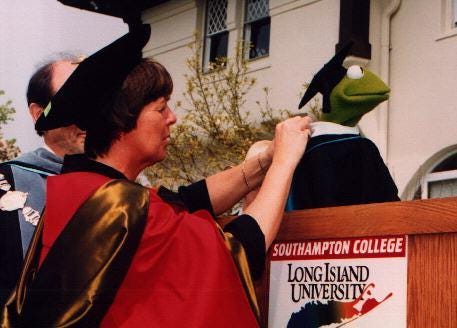Taylor Swift got a Honorary Doctorate from NYU - and people are mad.
"What the...?" said half the internet when NYU decided to confer an honorary doctorate in Fine Arts to Taylor Swift, all while fans were trying to cop tickets to the event for hundreds of $. A mess.
Yes, a mess I said.
And why do I care, I’m not even a fan of Taylor Swift? But the comments under every post, split in almost an even 50-50, got my attention. Inspiring to some, a joke to others, and absolutely unacceptable to most, Swift’s degree has caused some pandemonium online. And I noticed.
Half the commentary has been congratulatory, while other commenters found NYU’s gesture insulting to actual graduates who work hard and brave long-term debt in order to get an education.
But, if it is only honorary, should people care so much? Here’s really why people are peeved.
Why’s an honorary degree even a thing?
I regrettably couldn’t interview an NYU representative to get an official statement justifying the institution’s decision. But Wikipedia tells me that an honorary degree is an academic degree conferred by waiving all of the usual requirements. Typically a doctorate or master’s, the person getting this honor usually has no tertiary education but has done something important that they are recognized for.
The first ‘unearned’ degree was conferred by the University of Oxford in the 1470s to a certain Lionel Woodstock. The practice blossomed in the US in the 1600s, honoring people for one thing or the other.
Swift joins many celebrities who have gotten recognized for their contributions to the arts, or as activists and philanthropists - or just for, like, being a vibe apparently. Celebrities like Pharrel Williams and Celine Dion are among the recently honored by Berklee Collee of Music for their contribution to the arts and their enduring achievements. Getting honorary degrees is nothing new - many institutions around the world confer them. But people are really not chuffed about Swift’s one.
The funniest, and honestly my favorite, is Dr. Kermit the Frog getting an honorary degree in 1996. I mean, 10/10 for satire, and well-served too. The practice is honestly becoming a bit of a joke with the sheer number of people getting them for little beyond a fat check. To be fair, Muppets have no doubt an important place in American pop culture. But, I mean, in a world where Bill Gates can get honored with a doctorate from a university he dropped out of, why are we shocked that it takes next to nothing to get one of these fancy parchments when you can line university admin pockets?
And again, couldn’t get NYU to weigh in on this one, but literally, no one knows why she got the degree - and to be honest neither do I. Yes, people do get recognized for real contributions for the good of society and all (and that’s kind of important). But if we’re being honest the practice has gotten a tad laughable with just the sheer number of these degrees given out. And apparently these days you don’t even need a reason beyond the possibility of a sizable donation from a multimillionaire just so they have a bit of fun.
A numbers game
It’s apparently become big business to confer honorary degrees in the 2000s. In a period of three centuries, Yale University has awarded close to 3000 degrees. The University of Pennsylvania currently averages as many as 56 in a single year.
I mean, who are these people getting these degrees. Can we find a legitimate reason for each one? Probably not.
Universities honestly seem to be giving out honorary degrees for no reason other than to stroke the intellectual egos of wealthy donors while scoring some free publicity. So-called Swifties were clamoring to buy actual graduates’ tickets to the ceremony, offering up to $500 for a seat to see their fave deliver the commencement speech. Fact is even I sat up and took notice of the debate over this degree (I mean, fuck, I’m staying up writing a whole newsletter about it!).
The way I see it NYU has achieved exactly what it probably set out to do: create a publicity storm for its first in-person graduation ceremony post-pandemic.
Why people are mad
So I’m personally not upset by this (I honestly don’t care - I already have scathing opinions about the value of degrees in general, legitimate or otherwise). But I understand why people might be frothing at the mouth.
I didn’t attend any of the graduation ceremonies for both my degrees and I generally have never considered my university education a career move. It was hard, grueling at times, and tons of fun, sure, but I’m privileged to be the first graduate in my family. It was a proud moment, important for me, and what it signified for my kin.
So seeing a celebrity getting conferred a degree seemingly for ‘being a vibe’, I understand why that may seem like an institution cheapening the real struggle of getting an education these days.
Getting educated is hard. The availability of options to fund studies, the wide selection of courses and qualifications, and the increasing malleability of the higher education space hasn’t necessarily made it easier to obtain an education, particularly to the level and expertise of a Ph.D.
It’s understandable why people feel that nothing should detract from the dedication, self-discipline, and sacrifice of traditional Ph.D. students. It takes years of serious brain work to get a doctorate. And probably as many years to pay back all the money you use getting that qualification to begin with. Seeing celebrities getting conferred the honor, real or not, without any proof of their achieving success in what could be meaningfully described as educational or cultural activities is rightfully upsetting.
Other’s take this all in good humor. Reasoning: if it’s not real, it’s not a big deal. The world keeps spinning on its axis regardless of who gets a meaningless piece of paper right?
Well, true. But I think the symbolic meaning of such a practice is important because of the value education represents in people’s lives. It enables people to be productive members of society. And institutions absconding the responsibility of justifying the practice in favor of publicity leaves a bad taste in everyone’s mouth.
But, Swift’s doctorate aside, there have been well-deserved honorary degrees conferred to phenomenal individuals. My favorite was when the University of Johannesburg conferred an honorary doctorate to Esther Mahlangu, a world-renowned mural and canvas artist who has been painting for 73 years. She is a phenomenal woman, taught the art of Ndebele painting and beadwork by her mother and grandmother from the age of 10. Her’s is an inspirational story of lifelong mastery.
It was interesting ‘penning’ my two cents on this random online conversation about the value of honorary degrees. It made me think about the wider significance of getting an education and what it symbolizes, outside of my own opinions.
Now, I really am curious what your thoughts are. Does this practice of conferring degrees bother you? If you don’t care, tell me why. Let’s trade stories, friends.
Adieu for now!







